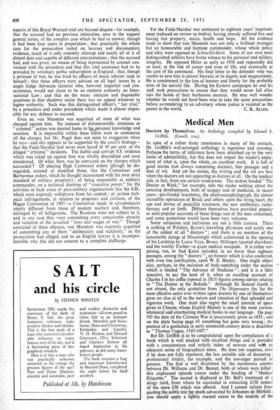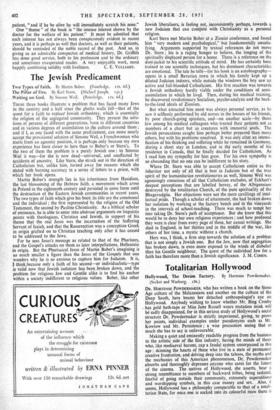Medical Men
Doctors by Themselves. An Anthology compiled by Edward F. Griffith. (Cassell. 2 IN spite of a rather dusty remoteness in many of the extracts, Dr. Griffith's well-arranged anthology is ingenious and amusing. Perhaps the terms of reference have been stretched up -to the very limits of admissibility, but this does not impair the reader's enjoy- tient of what is, upon the whole, an excellent work. It is full of good stories (not always concerning doctors), fine passages and a deal of wit. And yet the stories, the. writing and the wit are best when the doctors are not appearing as doctors at all. ' On the medical side, in fact, there are certain weaknesses. The section headed "The Doctor at Work," for example, tells the reader nothing about the amazing developments, both of surgery and of medicine, in recent years—pre-frontal leucotemy, the electroencephalograph, the almost incredible operations of Brock and others upon the living heart, the ups and downs of penicillin treatment, the new antibiotics, radio- therapy and so forth. DtlEtors themselves have provided popular or semi-popular accounts of these things and of the -men concerned, and some quotations would have been very welcome.
Some omissions and inclusions are not a little curious. There is nothing of , Polidori, Byron's travelling physician and surely one of the oddest of all- s doctors " ; and there is no -mention of 'the lamentable doings at Missolonghi which culminated in the opening of his Lordship by Lucca Vaya, Bruno, Millingen (quoted elsewhere) and the worthy Treiber—a queer medical escapade. It is rather sur- prising, too, to find Keats included, in no fewer than eighteen passages, among the "doctors" an honour which is also conferred, with even less justification, upon W. E. Henley. One might object also, perhaps, to the inclusion of body-snatching under the section which is headed "The 'Advance of Medicine " ; and it is a little macabre, to say the least of it, when an excellent account of Charles I in his coffin (opened in 1813) figures among entries relating to "The Doctor at the Bedside." Although Sir Samuel Garth is not absent, the -only quotation from The Dispensary (by far the most effective satire ever written upon doctors by one of themselves) gives no clue at all to the nature and intention of that splendid and vigorous work. One must also regret the small amount of space given to Cheyne, whose English Malady is one of the most curious, whimsical and entertaining medical books in our language. On page 393 the date of the Crimean War is inaccurately given. as ; and on the plate facing page 43 something has gone very wrong ; the portrait of a gentleman in early nineteenth-century dress is described as "Thomas Cogan, 1545-1607."
But Dr. Griffith is to be congratulated upon the compilation of a book which is well stocked with excellent things and is provided with a conscientious and orderly index of sources and with an adequate series of biographical notes. He does not suppress, even if he does not fully represent, the less amiable side of doctoring ; professional rivalry, for example, and the too-eager pursuit of guineas. The first is well illustrated .by the murderous combat between Dr. Williams and Dr. Bennet, both of whom were killed: this unpleasant 'episode comes wider the heading of "Medical Etiquette." The second is displayed in Dr. Bell's treatment of a stingy laird, from whom he succeeded in extracting £150 instead of the mere £50 which was offered. And I cannot refrain from quoting the..subtle test fox death advocated by Johannes de Mirfield ; you should apply a lightly roasted onion to the nostrils of the
patient, "and if he be alive he will immediately scratch his nose." One " theme " of the book is "the intense interest shown by the doctor for the welfare of his patient." It must be admitted that such interest has not always been conspicuously evident in recent years, and it is perhaps as well that doctors, as well as their patients, should be reminded of the noble record of the past. And so, in giving us an admirable conspectus of medical history, Dr. Griffith has done good service, both to his profession and to the ordinary and sometimes exasperated reader. A very enjoyable work, most happily combining solidity with liveliness. C. E. VULLIAMY.



































 Previous page
Previous page